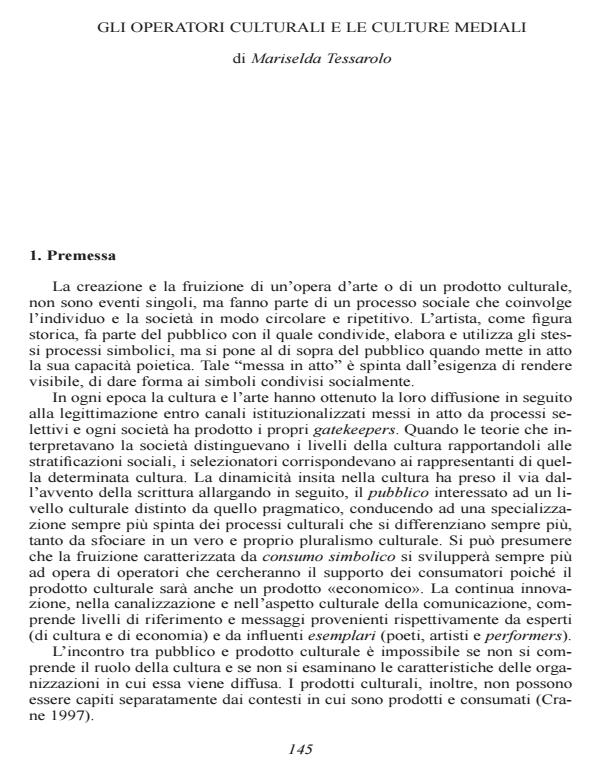Gli operatori culturali e le culture mediali
Titolo Rivista SOCIOLOGIA DELLA COMUNICAZIONE
Autori/Curatori Mariselda Tessarolo
Anno di pubblicazione 2005 Fascicolo 2004/35-36 Lingua Italiano
Numero pagine 7 P. Dimensione file 32 KB
DOI
Il DOI è il codice a barre della proprietà intellettuale: per saperne di più
clicca qui
Qui sotto puoi vedere in anteprima la prima pagina di questo articolo.
Se questo articolo ti interessa, lo puoi acquistare (e scaricare in formato pdf) seguendo le facili indicazioni per acquistare il download credit. Acquista Download Credits per scaricare questo Articolo in formato PDF

FrancoAngeli è membro della Publishers International Linking Association, Inc (PILA)associazione indipendente e non profit per facilitare (attraverso i servizi tecnologici implementati da CrossRef.org) l’accesso degli studiosi ai contenuti digitali nelle pubblicazioni professionali e scientifiche
The current culture puts the individual in a collective monologue produced by media. This monologue prepares and sets up the subjects transforming them in an audience. As a member of an audience, he/she is not participant in an experience or the actor of an event, but a user, a consumer of an artefact (object or image), whose creation he/she has not participated in. By its participation in the work the audience sets up an interaction that joins together reception and production, in a way that makes impossible to distinguish audience and artist. The emersion of a mass production with traditional and new media is causing a dissemination of aesthetical conventions, and the media aesthetics affects the way how the world is observed and the subject interacts: the socialization is the last stage of the acceptance of the new cultural forms produced by technology (Qvortrup 1998). Many types of culture operators are necessary in such a complex situation. They are requested to have a specialization, great flexibility and knowledge of the market, beside technical competence. The inability to know, except through symbols, comes from the uncertainty related to the deep nature of reality that involves every area of the knowledge, included the cultural one (Morin 1985). If subjectivity is the principle of the modern age, where modern people get their consciousness of freedom, the multiplicity of the points of view can also be asserted regarding to the multiplicity of cultures, reference systems and other; but this multiplicity is at the same time part of the same culture and the same reference system.;
Mariselda Tessarolo, Gli operatori culturali e le culture mediali in "SOCIOLOGIA DELLA COMUNICAZIONE " 35-36/2004, pp , DOI: